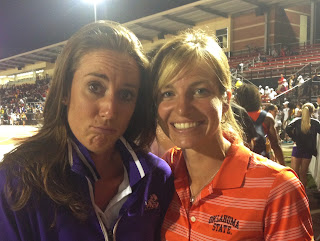In 2011 I listened to one of my favorite books on tape. It was Tina Fey's sort of memoir and chronology on work and life. 'Bossypants' was funny and informative. I listened each morning as I got ready to head out for work at WebMD. At one point she discusses how in being a comedian on stage with other comedians, the use of the word 'and' makes all the difference. It keeps the act going. The use of the word 'but' kills an act.
Speaking of keeping the act going, how can you use the word 'and' as I demonstrate below?
For years I went to bed early, woke up early, trained, and raced. I know I've mentioned before - I loved it! However, since not living that lifestyle anymore, I hadn't found a big reason to wake up early during the week, on the weekend, run much or run hard. Instead, I found myself wanting to have a nice morning. I figured this meant to wake up naturally, make a cup of coffee, spritz it up with steamed and frothed milk or Cool Whip out of the can, finish it off with a pinch of mocha powder, and read the latest installment of The Week under a little blanket. While I was living in Oklahoma I'd also go pet every horse, cow, donkey, and buffalo I could. Very nice morning. Then 11am would roll around and I wasn't sure what to do. Then 2pm would roll around, 4pm, and then the evening. The easy day cruised along. It seemed nice. Nothing too hard.
Earlier this month I put on a race bib again. It had been 3-4years since I'd put on a race bib, lined up, and paid attention to mile markers, splits, and what place I was in from start to finish. I didn't actively and specifically train for the Disney Wine & Dine 1/2 Marathon, yet I had a string of early morning workouts and some Sunday track practices where I had started to go hard. I am really glad I woke up before 5am, put on the race bib, got to the starting line, and let my nature kick in. I ran 6:26s over the first half of the run and was pretty happy about how I was feeling in my racing flats. I negative split the thing and ran 6:04 average over the last 5K with the last mile in 5:44. I worked hard over the last mile or two. I was happy and it was the nicest thing I've done for myself in quite some time. I finished and was so happy that I'd gone hard. It's not too often that we combine Nice AND Hard in our brains.
Can you think of what you do in your life that is Nice AND Hard?
Speaking of keeping the act going, how can you use the word 'and' as I demonstrate below?
For years I went to bed early, woke up early, trained, and raced. I know I've mentioned before - I loved it! However, since not living that lifestyle anymore, I hadn't found a big reason to wake up early during the week, on the weekend, run much or run hard. Instead, I found myself wanting to have a nice morning. I figured this meant to wake up naturally, make a cup of coffee, spritz it up with steamed and frothed milk or Cool Whip out of the can, finish it off with a pinch of mocha powder, and read the latest installment of The Week under a little blanket. While I was living in Oklahoma I'd also go pet every horse, cow, donkey, and buffalo I could. Very nice morning. Then 11am would roll around and I wasn't sure what to do. Then 2pm would roll around, 4pm, and then the evening. The easy day cruised along. It seemed nice. Nothing too hard.
 |
| That's me on the left along with the race directors in hats, my friend and co-worker, Kristen, and Jenny Simpson in the polka-dots. |
Can you think of what you do in your life that is Nice AND Hard?



















